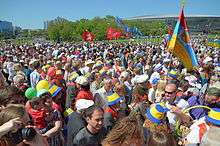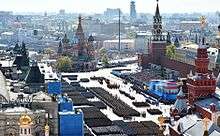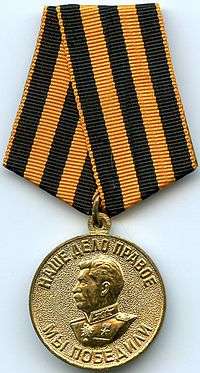Victory Day (9 May)
| Victory Day | |
|---|---|
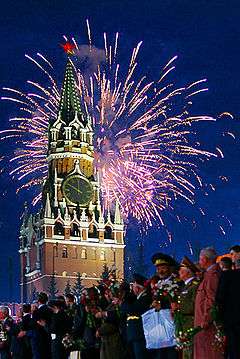 Victory Day celebrations in Moscow, 9 May 2005 | |
| Official name | Russian: День Победы etc.[a 1] |
| Observed by | Russia, most former Soviet states, Serbia, Israel and former member states of the Warsaw Pact/Comecon |
| Date | 9 May |
| Next time | 9 May 2019 |
| Frequency | annual |
Victory Day[a 1] is a holiday that commemorates the surrender of Nazis (or the German army) in 1945. It was first inaugurated in the 16[2] republics of the Soviet Union, following the signing of the German Instrument of Surrender late in the evening on 8 May 1945 (after midnight, thus on 9 May Moscow Time). The Soviet government announced the victory early on 9 May after the signing ceremony in Berlin.[3] Though the official inauguration occurred in 1945 the holiday became a non-labour day only in 1965 and only in certain Soviet republics.
In East Germany, 8 May was observed as "Liberation Day" from 1950 to 1966, and was celebrated again on the 40th anniversary in 1985. In 1975, a Soviet-style "Victory Day" was celebrated on 9 May. Since 2002, the German state of Mecklenburg-Vorpommern has observed a commemoration day known as the "Day of Liberation from National Socialism, and the End of the Second World War".[4]
History


The German Instrument of Surrender was signed twice. Initially, it was signed in Reims on 7 May 1945 by Alfred Jodl (chief of staff of the German OKW) for Germany, Walter Bedell Smith, on behalf of the Supreme Commander of the Allied Expeditionary Force, and Ivan Susloparov, on behalf of the Soviet High Command, in the presence of French Major-General François Sevez as the official witness. Since the Soviet High Command was not informed about the surrender, and because Susloparov, a relatively low-ranking officer, was not authorized to sign this document, the USSR requested that a second instrument of surrender be signed in Berlin. Joseph Stalin declared that the Soviet Union considered the Reims surrender a preliminary document, and Eisenhower immediately agreed with that. Another argument was that some German troops considered the Reims instrument of surrender as a surrender to the Western Allies only, and fighting continued in the East, especially in Prague.[5]
[Quoting Stalin:] Today, in Reims, Germans signed the preliminary act on an unconditional surrender. The main contribution, however, was done by Soviet people and not by the Allies, therefore the capitulation must be signed in front of the Supreme Command of all countries of the anti-Hitler coalition, and not only in front of the Supreme Command of Allied Forces. Moreover, I disagree that the surrender was not signed in Berlin, which was the center of Nazi aggression. We agreed with the Allies to consider the Reims protocol as preliminary.
A second surrender ceremony was organized in a surviving manor in the outskirts of Berlin late on 8 May, when it was already 9 May in Moscow due to the difference in time zones. Field-Marshal Wilhelm Keitel, chief of OKW, signed a final German Instrument of Surrender, which was also signed by Marshal Georgy Zhukov, on behalf of the Supreme High Command of the Red Army, and Air Chief Marshal Arthur Tedder, on behalf of the Allied Expeditionary Force, in the presence of General Carl Spaatz and General Jean de Lattre de Tassigny, as witnesses. The surrender was signed in the Soviet Army headquarters in Berlin-Karlshorst. Both English and Russian versions of the instrument of surrender signed in Berlin were considered authentic texts.
The text of the instrument of surrender explicitly stipulated complete disarmament of all German military forces and handing over all weapons.
Both the Reims and Berlin instruments of surrender stipulated that forces under German control to cease active operations at 23:01 hours CET on 8 May 1945. However, due to the difference in Central European and Moscow time zones, the end of war is celebrated on 9 May in the USSR and most post-Soviet countries.
To commemorate the victory in the war, the ceremonial Moscow Victory Parade was held in the Soviet capital on 24 June 1945.
Celebrations
During the Soviet Union's existence, 9 May was celebrated throughout the USSR and in the countries of the Eastern Bloc. Though the holiday was introduced in many Soviet republics between 1946 and 1950, it only became a non-labour day in the Ukrainian SSR in 1963 and the Russian SFSR in 1965. In the Russian SFSR a weekday off (usually a Monday) was given if 9 May fell on a Saturday or Sunday.
The celebration of Victory Day continued during subsequent years. The war became a topic of great importance in cinema, literature, history lessons at school, the mass media, and the arts. The ritual of the celebration gradually obtained a distinctive character with a number of similar elements: ceremonial meetings, speeches, lectures, receptions and fireworks.[6]
In Russia during the 1990s, the 9 May holiday was not celebrated with large Soviet-style mass demonstrations due to the policies of successive Russian governments. Following Vladimir Putin's rise to power, the Russian government began promoting the prestige of the governing regime and history, and national holidays and commemorations became a source of national self-esteem. Victory Day in Russia has increasingly become a celebration in which popular culture plays a central role. The 60th and 70th anniversaries of Victory Day in Russia (2005 and 2015) became the largest popular holidays since the collapse of the Soviet Union.[6]
In 2015 around 30 leaders, including those of China and India, attended the 2015 celebration, while Western leaders boycotted the ceremonies because of the Russian military intervention in Ukraine.[7][8]
Countries celebrating 9th of May
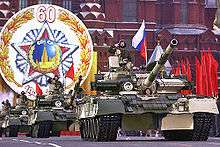
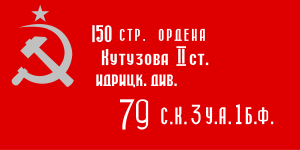







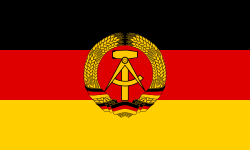



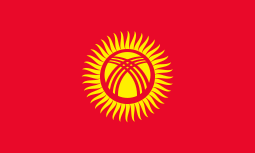


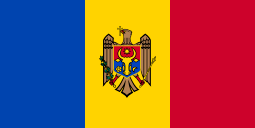
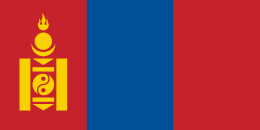





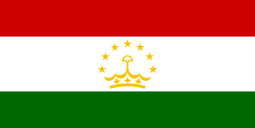
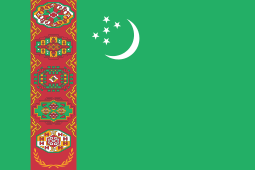

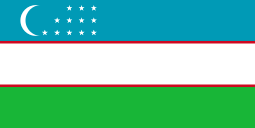

Unrecognized post-Soviet states also celebrate 9 May:
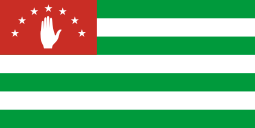
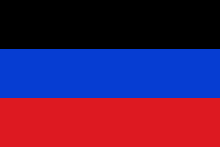

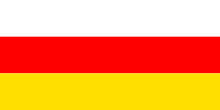
.svg.png)
Russophone populations in many countries celebrate the holiday regardless of its local status,[26] organize public gatherings and even parades on this day.[27] Some multilanguage broadcasting television chains translate the "Victory speech" of the Russian president and the parade on Red Square.[28]
RT also broadcasts the parade featuring live commentary, and also airs yet another highlight of the day – the Minute of Silence at 6:55pm MST, a tradition dating back to 1965.
Soviet and post-Soviet symbols associated with the Victory Day
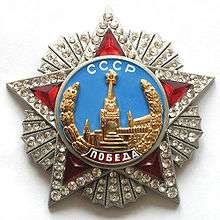

.jpg)
Soviet Union
| Order of Victory |
Russia
Ukraine
| Medal for the 60th Anniversary of the Victory in the Great Patriotic War of 1941–1945 | |
| Medal for the 70th Anniversary of the Victory over Nazism |
Kazakhstan
| Medal for the 60th Anniversary of the Victory in the Great Patriotic War of 1941–1945 | |
| Medal for the 70th Anniversary of the Victory in the Great Patriotic War of 1941–1945 |
Israel
| Fighters against Nazis Medal |
Gallery of the Celebrations
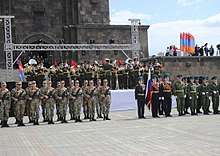 Celebrations at the Mother Arnenia monument in Yerevan.
Celebrations at the Mother Arnenia monument in Yerevan.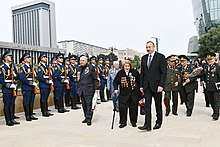 President Ilham Aliyev with war veterans.
President Ilham Aliyev with war veterans.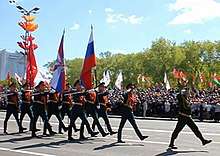 The victory parade in Minsk.
The victory parade in Minsk..jpg) Belarusian WWII veterans at an independence day parade in Minsk.
Belarusian WWII veterans at an independence day parade in Minsk.- A T-72 tank during a Victory Day parade in 2015.
 A victory day parade in Bishkek in 2015.
A victory day parade in Bishkek in 2015.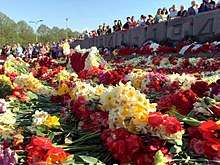 Victory Day celebrations in Victory Park (Riga).
Victory Day celebrations in Victory Park (Riga).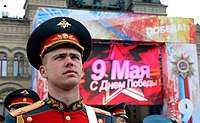 A soldier during a parade on Red Square in 2017.
A soldier during a parade on Red Square in 2017.._(13147721854).jpg) Victory Day in 1980
Victory Day in 1980 A Victory Day Parade in Dushanbe
A Victory Day Parade in Dushanbe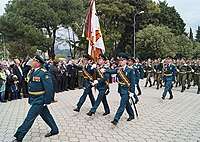
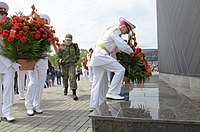
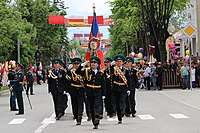 South Ossetian troops at the victory day parade in 2018.
South Ossetian troops at the victory day parade in 2018..jpg) Victory day in Tiraspol, 2017.
Victory day in Tiraspol, 2017.
See also
- Moscow Victory Day Parade
- End of World War II in Europe
- German Instrument of Surrender, 1945
- Hero city
- Minute of Silence
- Pobediteli
- Victory Day in other countries
- Victory Day over Nazism in World War II
- Victory over Japan Day
- Victory Day Parades (9 May)
- Victory in Europe Day (Israel)
- Time of Remembrance and Reconciliation
- Reunification Day (Vietnam)
Notes
- 1 2 Russian: День Победы, Den' Pobedy
Ukrainian: День Перемоги, Den' Peremohy
Belarusian: Дзень Перамогі, Dzień Pieramohi
Uzbek: Gʻalaba kuni, Ғалаба куни
Kazakh: Жеңіс Күні, Jeñis Küni
Georgian: გამარჯვების დღე, gamarjvebis dghe
Azerbaijani: Qələbə Günü
Moldovan: Ziua Victoriei, Зиуа Викторией
Latvian: Uzvaras diena
Kyrgyz: Жеңиш майрамы, Jengish Mayramy
Tajik: Рӯзи Ғалаба, Rūzi Ghalaba
Armenian: Հաղթանակի օրը, Haght'anaki ory
Turkmen: Ýeňişlar Harçlaarsiň, Йеңишлар Харчлаарсиң
Estonian: Võidupüha ("Victory Holiday")
Tatar: Cyrillic Җиңү көне, Latin Ciñü köne
Serbo-Croatian: Dan pobjede/pobede, Дан победе/побједе
Hebrew: יום הניצחון, Yóm HaNicaħón
Arabic: عيد النصر, ʿīd al-Naṣir
Bulgarian: Ден на победата, Den na pobedata
Spanish: Dia de Victoria
Czech: Den vítězství
Slovak: Deň víťazstva
German: Tag des Sieges
Hungarian: Győzelem Napja
Mongolian: Ялалтын өдөр, Yalaltyn ödör
Polish: Dzień Zwycięstwa
Romanian: Ziua Victoriei
Vietnamese: Ngày chiến thắng
References
- ↑ "Victory Day in Ukraine - Victory over Nazism in World War II | www.bestkievguide.com". www.bestkievguide.com. Retrieved 2018-09-08.
- ↑ There were 16 republics in the USSR on May 8, 1945. The Karelo-Finnish SSR was abolished in 1956.
- ↑ Earl F. Ziemke, 1990, Washington DC, CENTER OF MILITARY HISTORY, CHAPTER XV:The Victory Sealed Page 258 last 2 paragraphs
- ↑ "Gesetz über Sonn- und Feiertage des Landes Mecklenburg-Vorpommern". Mv.juris.de. Archived from the original on 20 June 2012. Retrieved 15 July 2012.
- ↑ Zhukov, Georgy (2002). Memoirs (in Russian). Olma-Press. p. 329.
- 1 2 Ločmele, K.; Procevska, O.; Zelče, V. (2011). "Celebrations, Commemorative Dates and Related Rituals: Soviet Experience, its Transformation and Contemporary Victory Day Celebrations in Russia and Latvia" (PDF). Muižnieks, N. (ed.). The Geopolitics of History in Latvian-Russian Relations. Riga: Academic Press of the University of Latvia. Archived from the original (PDF) on 7 August 2011.
- ↑ Soldatkin, Vladimir; Stubbs, Jack; Heritage, Timothy (2015-05-09). "Russia stages WW2 victory parade as Ukraine bristles". Reuters. Retrieved 2016-05-09.
- ↑ Parfitt, Tom (2015-05-09). "Russia's Victory Day Parade marks new East-West divide". The Daily Telegraph. Retrieved 2016-05-09.
- ↑ Anon. "Victory and Peace Day: May 9". Holidays around the world. A Global World. Retrieved 9 May 2015.
- ↑ Anon. "Victory Day Observed in Azerbaijan". Holidays around the world. A global world. Retrieved 9 May 2015.
- ↑ http://bnr.bg/en/post/100968559/bulgaria-marks-europe-day-and-victory-day
- ↑ Israel passed the law on July 26 2017.
- ↑ Israel to host most extensive Victory Day celebrations outside of former USSR Archived 27 July 2014 at the Wayback Machine. 7 May, Voice of Russia
- ↑ "Военные парады в Казахстане за 15 лет "подорожали" в одиннадцать раз". Radiotochka.kz | Новости Казахстана – события, мнения, аналитика. Retrieved 2017-09-22.
- ↑ http://theubpost.mn/2016/05/15/mongolia-marks-victory-day/
- ↑ "Mamy nowe święto państwowe. Po raz pierwszy obchodzimy Narodowy Dzień Zwycięstwa"
- ↑ Anon. "For Russia 70th WWII anniversary looms large". Russia behind the headlines. RBTH network. Retrieved 9 May 2015.
- ↑ http://www.news.tj/ru/news/stalinabad-9-maya-1945-goda
- ↑ https://books.google.com/books?id=fG9zk5Y3MugC&pg=PA48&dq=parade+in+ashgabat+1997&hl=en&sa=X&ved=0ahUKEwjMlsyi94XZAhVCSK0KHeqQB18Q6AEIHjAA#v=onepage&q=parade%20in%20ashgabat%201997&f=false
- ↑ Lviv Oblast, however, does not recognize Victory Day, but rather recognizes the day as a memorial to all wartime victims of both the Soviet and Nazi regimes, as well as all of those caught in between.
- ↑ «Велику Вітчизняну війну» замінили на «Другу світову» — закон (in Ukrainian). Fakty. ICTV. 09.04.2015
- ↑ Депутати врегулювали питання про відзначення в Україні перемоги над нацизмом (in Ukrainian). The Ukrainian Week. 09.04.2015
- ↑ Poroshenko signed the laws about decomunization. Ukrayinska Pravda. 15 May 2015
Poroshenko signs laws on denouncing Communist, Nazi regimes, Interfax-Ukraine. 15 May 2015 - ↑ http://www.unn.com.ua/uk/news/1463653-1-87
- ↑ "Their memory lives on". Ut.uz. Archived from the original on 16 May 2012. Retrieved 15 July 2012.
- ↑ "Estonia: Local Russians Celebrate End Of World War II". Radio Free Europe/Radio Liberty. 9 May 2007. Archived from the original on 13 May 2014. Retrieved 19 April 2015.
- ↑ В Канаде прошли праздничные мероприятия, посвященные Дню Победы [Russian Orthodox Church in Toronto celebrates Victory Day]. Mospat.ru (in Russian). 8 May 2005. Archived from the original on 28 September 2011. Retrieved 15 July 2012.
- ↑ "May 9 parade TV-event from Israel" (in Russian). Courier (Israeli newspaper). 9 May 2009. Archived from the original on 10 February 2012. Retrieved 15 July 2012.
External links
| Wikimedia Commons has media related to |
- Major photos period of time


- Interactive map of the Great Patriotic War between the USSR and Nazi Germany
- 9 мая, 1991 год, Алма-Ата
